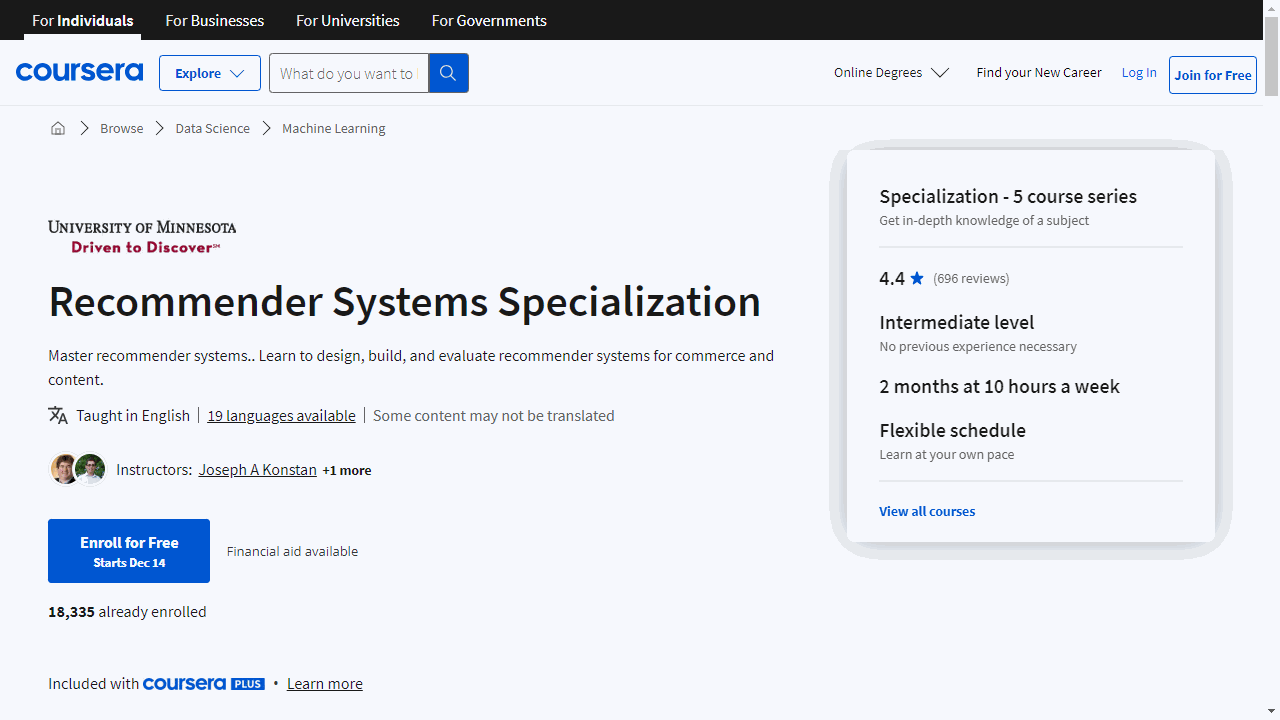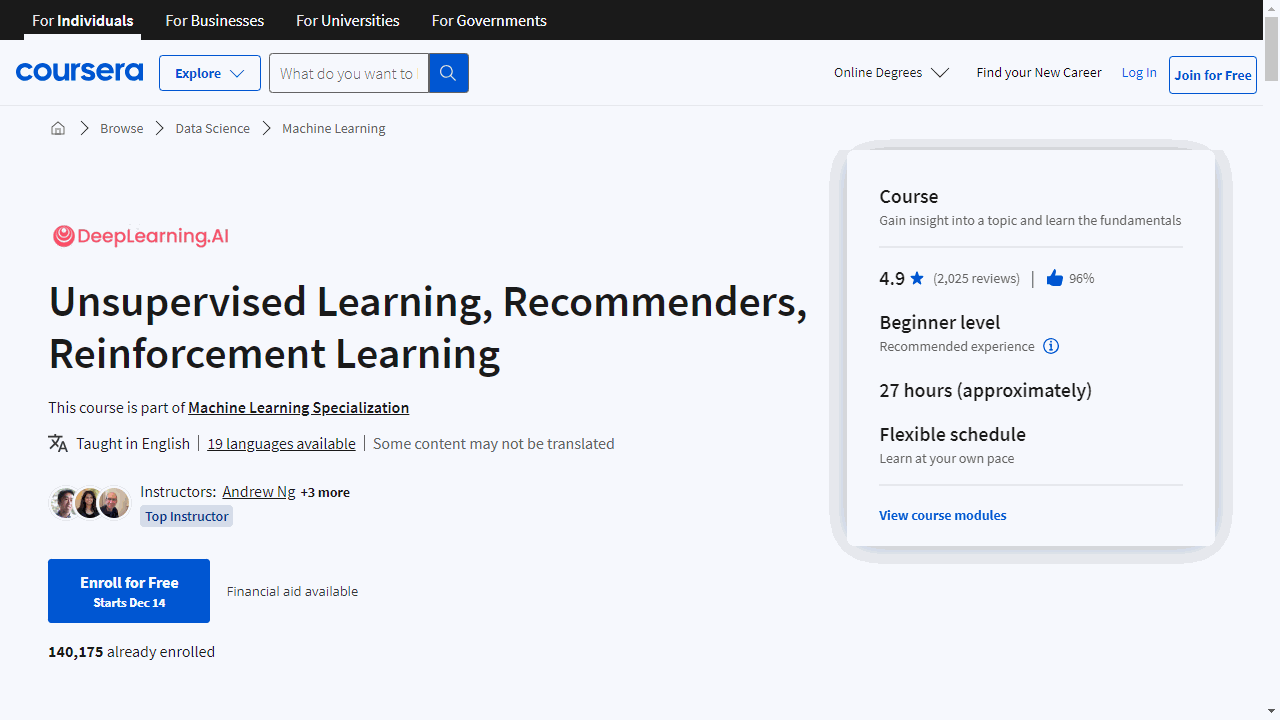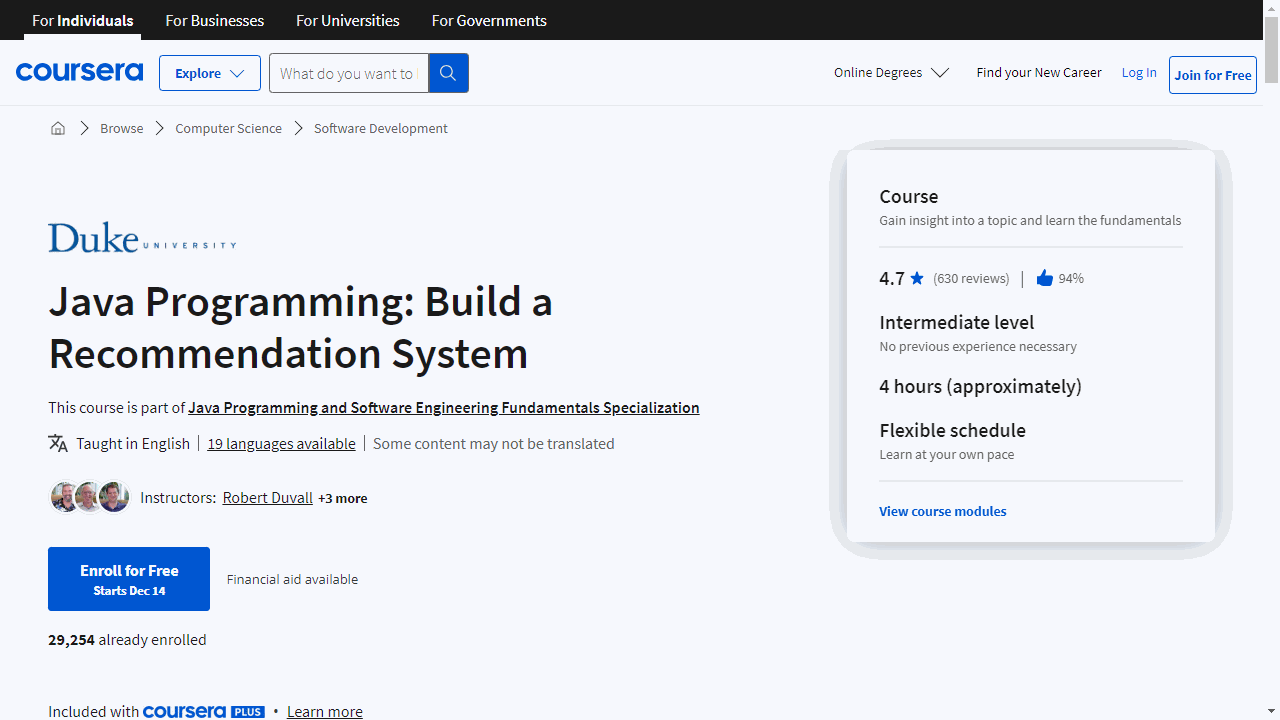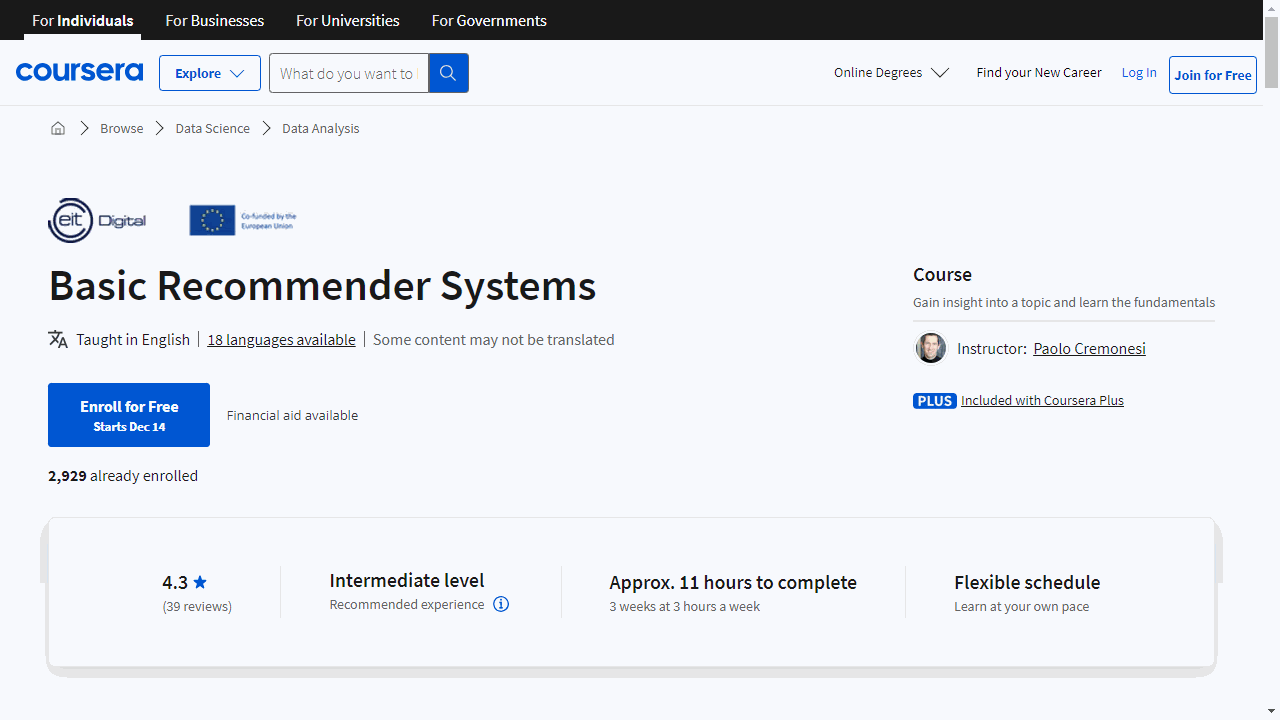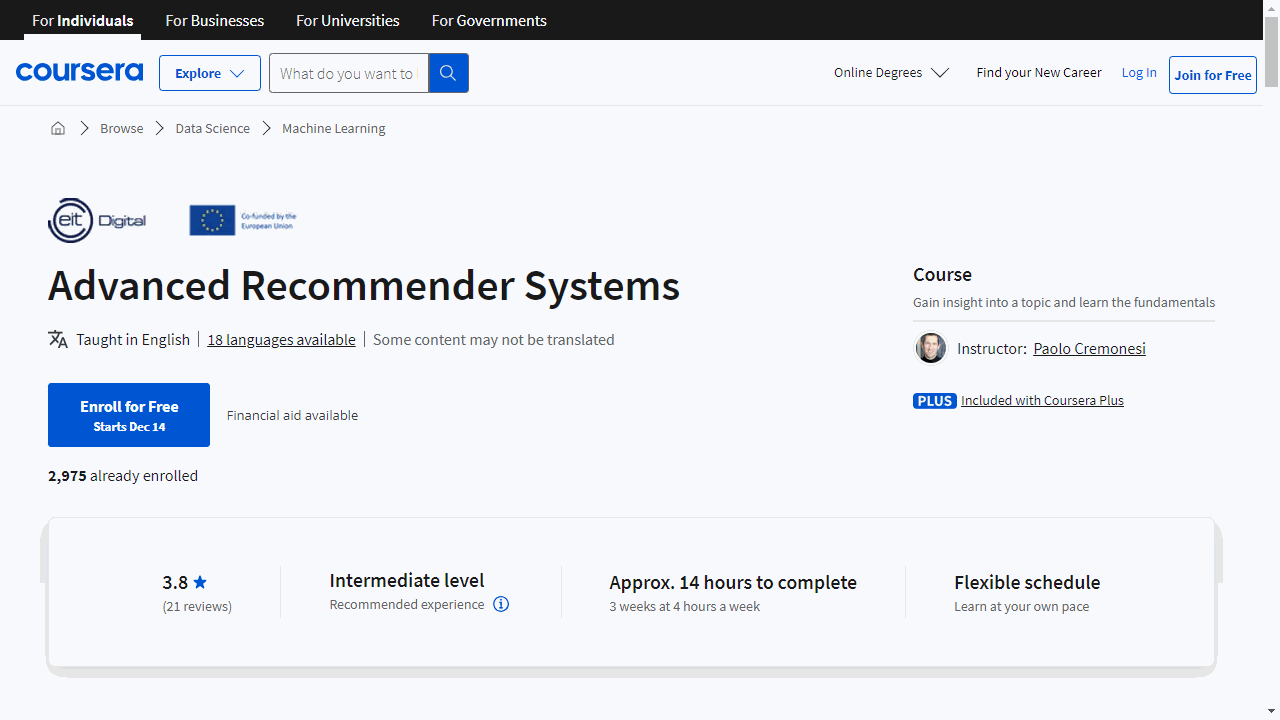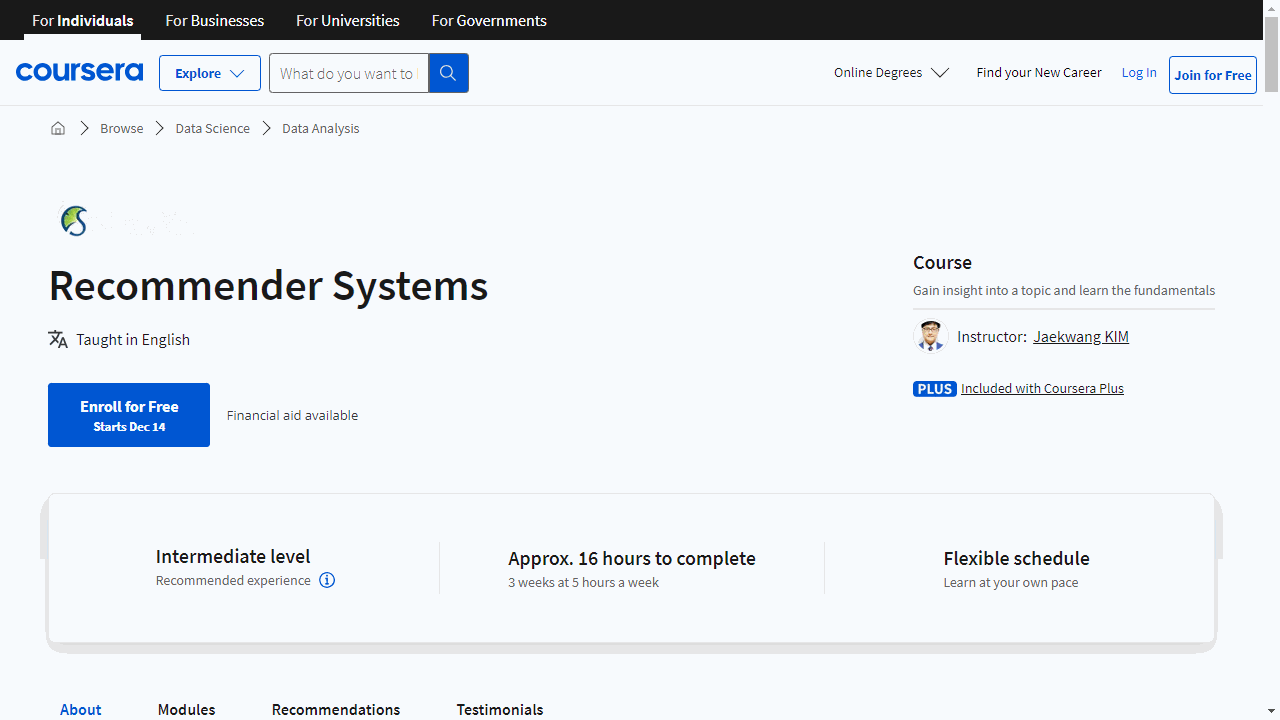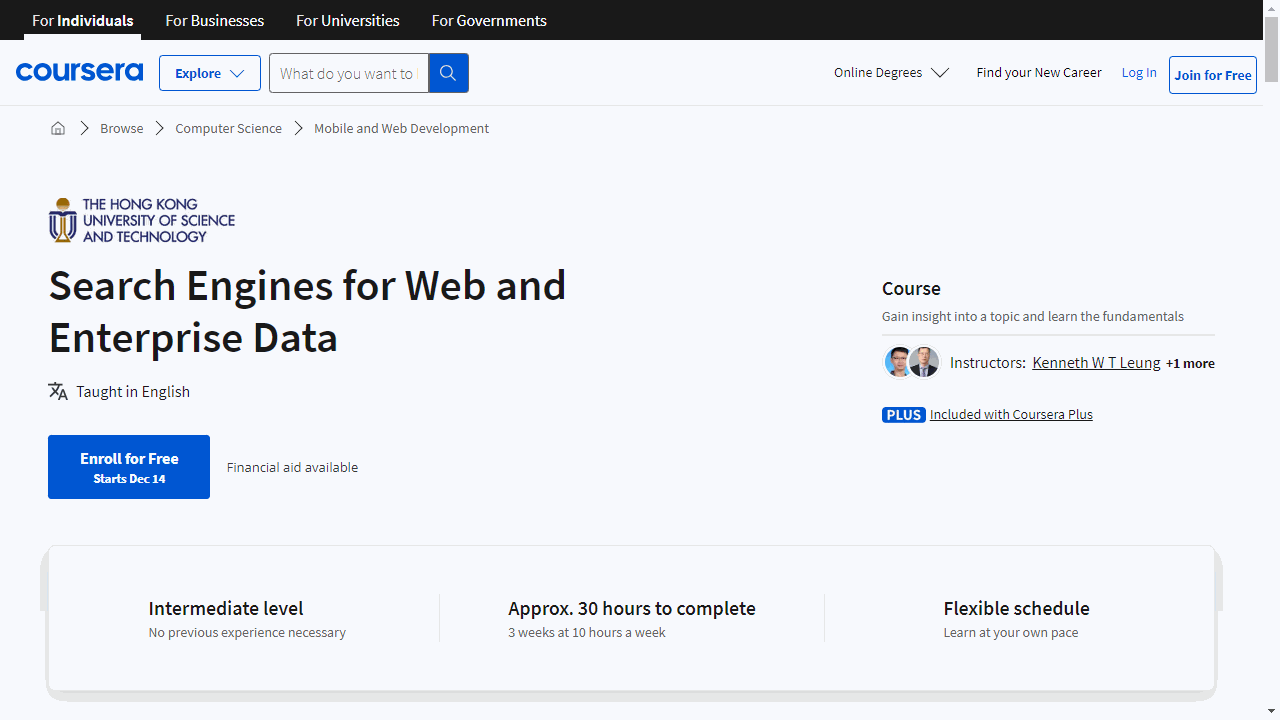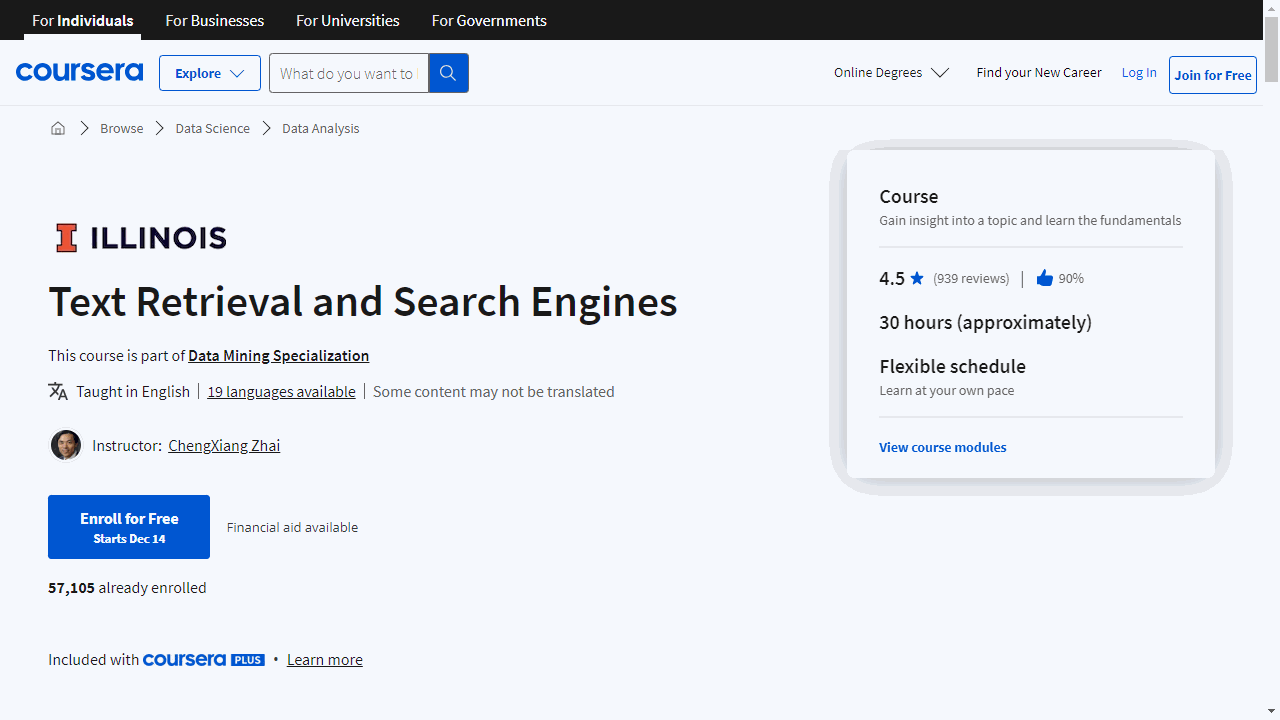Recommender systems are a crucial part of today’s digital landscape, powering the personalized suggestions you see on platforms like Netflix, Amazon, and Spotify.
These systems analyze user data and preferences to predict what they might like, enhancing their experience and driving engagement.
Learning about recommender systems can open up exciting career opportunities in data science, machine learning, and software development, allowing you to build smarter and more engaging digital experiences.
Finding a good recommender systems course on Coursera can be challenging, with so many options to choose from.
You’re looking for a program that’s comprehensive, engaging, and taught by experts, but also fits your learning style and goals.
We’ve reviewed numerous courses and based on our analysis, Recommender Systems Specialization by the University of Minnesota stands out as the best course overall.
This specialization offers a comprehensive and practical approach, covering everything from the fundamentals of recommender systems to advanced techniques like matrix factorization and hybrid recommenders.
The course features hands-on exercises, real-world examples, and expert instructors, ensuring you gain a solid understanding of the field and are prepared to build sophisticated recommender systems.
This is just one of many great options for learning about recommender systems on Coursera.
Keep reading for a curated list of courses covering various aspects of recommender systems, from foundational knowledge to advanced techniques and practical applications.
We’ve got you covered, whether you’re a beginner or a seasoned professional looking to enhance your skills.
Recommender Systems Specialization
Provider: University of Minnesota
This is a comprehensive specialization that equips you with the skills to build and evaluate sophisticated recommender systems.
Kick off with “Introduction to Recommender Systems: Non-Personalized and Content-Based,” where you’ll grasp the essentials.
You’ll learn to craft basic recommendations using summary statistics and delve into content-based filtering.
If you’re hands-on, you’ll appreciate using spreadsheet tools for practical exercises, and if you choose the honors track, you’ll get to code with the LensKit toolkit.
Progress to “Nearest Neighbor Collaborative Filtering” to master personalized recommendations.
This course demystifies user-user and item-item collaborative filtering, teaching you to tailor suggestions based on user similarities and product associations.
You’ll understand the strengths and limitations of these methods, setting you up to make informed decisions in your designs.
In “Recommender Systems: Evaluation and Metrics,” you’ll focus on performance.
Discover how to measure accuracy, support user decisions, and enhance diversity and serendipity in your recommendations.
You’ll learn to conduct offline evaluations with precision, preparing you to assess recommender systems against various user and business goals.
“Matrix Factorization and Advanced Techniques” takes you deeper into the world of machine learning.
Here, you’ll explore matrix factorization, reducing the complexity of user-product preferences.
You’ll also get acquainted with hybrid recommenders, combining multiple algorithms for more effective systems.
The “Recommender Systems Capstone” is where everything comes together.
You’ll apply your knowledge to a real-world scenario, selecting and justifying a recommender system design.
Whether you’re analyzing datasets or exploring results, you’ll craft a compelling report to document your analysis and recommendations.
Throughout these courses, you’ll understand TF-IDF, and get comfortable with terms like matrix factorization and collaborative filtering.
By the end of the specialization, you’ll be ready to create recommender systems that are not just accurate but also bring new and unexpected delights to users.
Unsupervised Learning, Recommenders, Reinforcement Learning
Provider: DeepLearning.AI
This is a comprehensive program that gives you a solid understanding of unsupervised learning, the mechanics behind recommender systems, and the principles of reinforcement learning.
You’ll start with unsupervised learning, where you’ll master clustering through the K-means algorithm.
This technique is essential for grouping data without predefined labels, like sorting different types of fruit without knowing their names.
You’ll also learn to identify outliers in data using anomaly detection, which is crucial for recognizing patterns that don’t fit the norm.
The course then guides you through the intricacies of recommender systems.
You’ll understand collaborative filtering, where algorithms predict your preferences based on others’ likes and dislikes.
You’ll also delve into content-based filtering, which suggests items similar to what you’ve enjoyed before.
Practical TensorFlow exercises will help you apply these concepts in real-world scenarios.
When it comes to reinforcement learning, the course shines by breaking down complex ideas into understandable chunks.
You’ll explore how to develop policies that guide decision-making processes, akin to teaching a robot how to navigate a new planet.
The Bellman Equation will become a tool in your arsenal, helping you to optimize these decisions.
You’ll also refine algorithms with techniques like ε-greedy policy and mini-batch updates, enhancing the learning capabilities of AI agents.
Throughout the course, optional labs offer hands-on experience, and insights from AI pioneers Andrew Ng and Chelsea Finn provide inspiration and context.
If you’re eager to share your knowledge, there’s even an opportunity to mentor fellow learners.
Java Programming: Build a Recommendation System
Provider: Duke University
If you like programming in Java, this course gives you hands-on experience in creating systems that suggest products or content to users, much like the ones used by Netflix or Amazon.
You’ll start with an introduction that sets the stage for the importance and impact of recommendation systems.
It’s not just theory; you’ll see the real-world applications of what you’re about to learn.
Then, you’ll dive into the nuts and bolts of handling data, a crucial step for any recommendation system.
You’ll learn how to read and store data effectively, which is the foundation of your project.
As you progress, you’ll tackle programming exercises that bring your learning to life.
In Step One, you’ll code your first part of the recommendation system, focusing on understanding user preferences through average ratings.
Next, you’ll enhance your system’s relevance by learning about filtering recommendations.
This skill is key to tailoring suggestions to individual users, and you’ll practice it through a dedicated programming exercise.
The course also covers calculating weighted averages, teaching you to prioritize certain recommendations over others.
This technique is vital for fine-tuning the suggestions your system makes.
Finally, the instructor team bids you farewell, leaving you with a comprehensive understanding of building a recommendation system from scratch.
Throughout the course, detailed module descriptions and resources are provided to support your learning journey.
Each programming exercise builds on the last, ensuring you have a solid grasp of each concept before moving on.
By the end of this course, you’ll have the practical skills to build a Java-based recommendation system, making you a valuable asset in the tech world.
Basic Recommender Systems
Provider: EIT Digital
The course starts with the basics, introducing you to the taxonomy of recommender systems and the foundational matrices—item-content and user-rating—that power recommendations.
You’ll learn how to infer user preferences, a crucial skill for creating personalized experiences.
The course also demystifies non-personalized recommender systems, explaining global effects and the nuances between implicit and explicit ratings.
As you progress, you’ll delve into the quality of recommender systems, discovering how to gauge their performance using quality indicators and evaluation techniques.
You’ll tackle the challenges of dataset partitioning and overfitting, ensuring your system remains accurate and reliable.
The course covers essential metrics—error, classification, and ranking—to help you measure the effectiveness of your recommendations.
You’ll also engage with the ethical implications of recommender systems and their influence on decision-making.
When it comes to filtering techniques, you’ll get hands-on with content-based filtering, learning about cosine similarity and matrix notation.
The course enhances your understanding with TF-IDF and k-nearest neighbors, providing you with the tools to refine recommendations.
Collaborative filtering is another key focus.
You’ll compare user-based and item-based methods, and explore the differences between model-based and memory-based systems.
The course also introduces you to the concept of recommendation as association rules.
Throughout the course, the instructor offers clear recaps with both content-based and collaborative filtering queries.
Advanced Recommender Systems
Provider: EIT Digital
This is a deep dive into the techniques that power the smart suggestions you see on platforms like Netflix and Amazon.
Right from the start, the instructor will introduce you to the essentials of Collaborative Filtering (CF), teaching you how to solve it as an optimization problem.
This is crucial for understanding how to match users with items they’ll love.
You’ll get hands-on with SLIM, a method that refines recommendations by learning directly from user-item interactions.
Bayesian Probabilistic Ranking is also on the agenda, helping you predict user preferences with a statistical approach.
The course doesn’t stop there.
You’ll master Matrix Factorization, including Funk SVD and SVD++, which are key to deciphering complex user-item relationships.
Asymmetric SVD and Pure SVD are also covered, offering you more tools to fine-tune your recommender systems.
Hybrid Recommender Systems are another highlight.
You’ll learn to blend different recommendation strategies, using Linear and List Combination, as well as Pipelining, to create a more robust system.
Explainability in Machine Learning is a critical topic you’ll explore, ensuring you can articulate why your system makes its suggestions, which is vital for user trust.
Factorization Machines (FM) are a core part of the curriculum, giving you the versatility to work with diverse data types and contexts, enhancing the personalization of your recommendations.
And if you’re competitive, the RecSys Challenge on Kaggle will give you a chance to put your new skills to the test in a real-world scenario.
Throughout the course, regular recaps and conclusions from the instructor ensure you’re absorbing the material effectively.
By the end, you’ll have a comprehensive understanding of advanced recommender systems, ready to build or improve upon them with confidence.
Recommender Systems
Provider: Sungkyunkwan University
This is a comprehensive program that starts with the essentials and progresses to advanced techniques.
You’ll begin by understanding how to read data and gauge the accuracy of your recommendations.
This foundational knowledge is crucial for ensuring that users get spot-on suggestions.
The course then delves into collaborative filtering (CF), teaching you how to leverage user preferences to guide recommendations.
You’ll compare user-based CF with item-based CF, learning the strengths and applications of each.
Matrix factorization, a technique that simplifies complex recommendation tasks, is a core part of the curriculum.
You’ll explore various algorithms and understand how they enhance recommendation quality.
Practical application is a key component, with hands-on exercises using the Surprise package, a Python library designed for recommender systems.
You’ll also get to experiment with deep learning through Keras 2, equipping you with cutting-edge skills.
Handling large-scale data is another critical skill you’ll acquire.
The course addresses challenges like the cold start problem—how to recommend new items or to new users—and scalability, ensuring your system can grow efficiently.
Advanced topics include blending collaborative filtering with matrix factorization and employing neural networks to push the boundaries of recommendation accuracy.
You’ll be equipped to build sophisticated, scalable recommender systems using the latest tools and techniques.
Search Engines for Web and Enterprise Data
Provider: The Hong Kong University of Science and Technology
If you’re searching for a course specific about search engines, this could be your perfect match.
Starting with an overview of search engines, you’ll quickly move to the core of how they operate.
You’ll grasp the essentials of the TFxIDF and Vector Space Model (VSM), which are key to connecting queries with accurate results.
These models are crucial for understanding the relevance of documents in a sea of data.
You’ll also tackle the complexities of synonyms and scalability, ensuring that the search engine can manage extensive information efficiently.
The course delves into the Extended Boolean Model, enhancing search flexibility, and introduces you to PageRank and the HITS Algorithm, which determine the significance of web pages.
Performance evaluation is another critical component.
You’ll learn how to assess search engines through precision and recall metrics, and benchmarking, which acts as a performance indicator.
The syllabus covers the technicalities of preparing data for search engines, including stopword removal and stemming.
You’ll understand the importance of indexing and the role of algorithms in refining search results.
Personalization is a focal point, with sessions on user preference mining and applying these preferences to improve ranking algorithms.
This is where the course aligns closely with recommender systems, teaching you to tailor search results based on user behavior and preferences.
Advanced topics like N-gram analysis, term discrimination values, and mutual information will equip you with the skills to detect linguistic patterns and enhance term selection for indexing.
For those interested in enterprise search engines, the course addresses specific challenges and advanced requirements, preparing you to handle search solutions in a business context.
You’ll have a comprehensive understanding of the technical underpinnings of search engines and how they can be leveraged to create effective recommender systems.
Text Retrieval and Search Engines
Provider: University of Illinois at Urbana-Champaign
This course is a comprehensive journey through the mechanics of search engines and the intricacies of how they present information.
Starting with the essentials, you’ll learn about natural language content analysis and text access—key components in understanding how search engines interpret queries.
You’ll tackle the text retrieval problem and explore various methods to retrieve relevant information efficiently.
The course introduces you to the Vector Space Model, a fundamental concept in organizing text data for computational processing.
You’ll learn how to refine this model for better performance and understand the principles of document length normalization and term frequency transformation.
Evaluating the effectiveness of text retrieval systems is crucial, and you’ll gain insight into the evaluation process through practical measures and the assessment of ranked search results.
Real-world programming assignments will allow you to apply these concepts, bridging the gap between theory and practice.
As you progress, you’ll delve into advanced topics like the Probabilistic Retrieval Model and the Statistical Language Model, which are vital for predicting user intent.
These models form the backbone of modern search algorithms and are essential knowledge for anyone interested in NLP.
In the final week, the course hones in on recommender systems, covering both content-based and collaborative filtering.
You’ll understand how these systems analyze user preferences and behaviors to make personalized suggestions.
By the end of this course, you’ll have a solid foundation in the principles of text retrieval and the practical skills to implement recommender systems.
